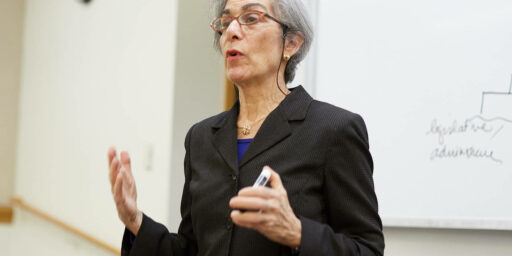EDUCATION GAP
William Raspberry has a rather provocative column on the white-black gap in student achievement.
Education is different. You might wake up one morning to find the graders and cement trucks on the street outside, brought there by righteous protest. But your children will not wake up one morning and find a truckload of education at the curb. Education cannot be just delivered — it has to be actively sought and received. And that fact may account as much as any other single factor for the academic achievement gap between blacks and whites in America.
Two very different books make that point with compelling clarity. Abigail and Stephan Thernstrom (No Excuses: Closing the Racial Gap in Learning) begin by describing the breadth of the gap. “By 12th grade, on average, black students are four years behind those who are white or Asian. Hispanics don’t do much better.” Now that’s a huge gap. It doesn’t mean that all black and Hispanic youngsters are failing, but it assuredly does mean that we are handing out a lot of high school diplomas to children capable of performing only at an eighth-grade level in reading, math, history and geography.
***
John Ogbu, who died in August, focused on a problem that in many ways is more puzzling: the consistent underachievement of black children in affluent suburbs.
His specific focus was Shaker Heights, Ohio, where black parents asked him to find out why their middle-class children were lagging behind their white counterparts.
Shaker’s black children, he found out right away, outstrip black children virtually everywhere else in the state — and in much of the nation. Indeed, many of their families moved to Shaker Heights quite specifically for its highly reputed schools. They wanted their children to have an excellent education. But the gap between them and their white schoolmates is significant — and dismaying. White kids predominate in the advanced placement and honors courses. Black children, who gravitate to the easier “general education” and “college prep” courses, nonetheless racked up 80 percent of the Ds and Fs.
***
But he found something else that must have surprised him. The black students were quite open in telling the researchers that, in general, their white classmates studied more, worked harder and cared more about getting good grades.
***
There is plenty of literature on why black youngsters put forth less academic effort — some of it linked to peer pressure and a great deal of the rest attributed to the alienating effects of racism, white cultural domination or “Eurocentrism.” Most of it, I suspect, contains at least a grain of truth.
But what we need, if our children are going to make it in this highly competitive world, is not so much explanation as change. We can wait for white America to change its attitude toward blacks. Or we can change the way we respond to what we believe that attitude to be. Given the fact that white America is doing OK the way things are, the choice seems obvious.
The obstacles to changing a culture are rather steep, unfortunately.





